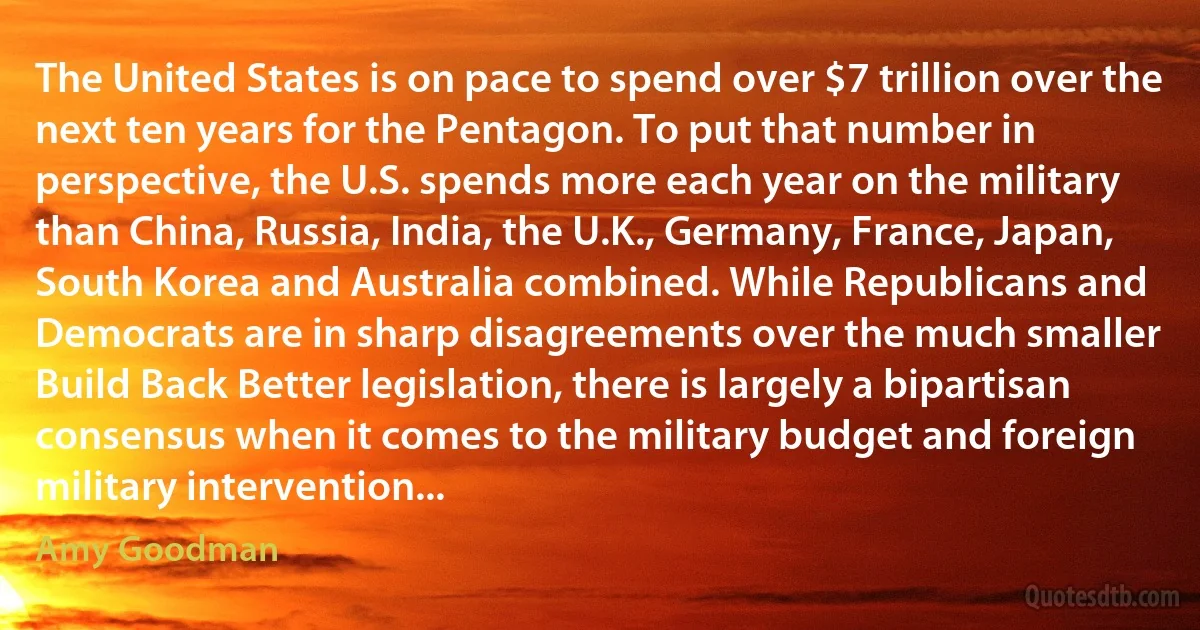Foreign Quotes - page 71
I was quite surprised and even shocked and amused when I found out what he'd said [...] I was glad. I knew it would help the book's sales and I was not bothered by who it was coming from. If he shares with me a deep dislike for the certain aspects of US foreign policy, then I'm not going to spurn any endorsement of the book by him. I think it's good that he shares those views and I'm not turned off by that.

William Blum
These horrifying digital snapshots of the American dream in action on foreign soil are worse than anything even I could have expected. I have been in this business a long time and I have seen many staggering things, but this one is over the line. Now I am really ashamed to carry an American passport.

Hunter S. Thompson
Even the strongest advocate of the Aryan invasion theory cannot, in all honesty, point out any specific spot outside India to which the origin of any, simply any, aspect of Hinduism could be attributed. Even if, for the purpose of this chapter, it is presumed that the 'Aryans' came from outside India, and that they imposed the Hindu religion on local inhabitants (two questions which will be dealt with subsequently in this book), it will have to be admitted that there is no trace of any foreign connections in Hinduism, much less the consciousness, of any such connections, among Hindus-and least of all, any foreign loyalties, associable with such foreign connections".

Shrikant Talageri
In offering to you, my countrymen, these counsels of an old and affectionate friend, I dare not hope they will make the strong and lasting impression I could wish; that they will control the usual current of the passions, or prevent our nation from running the course, which has hitherto marked the destiny of nations. But, if I may even flatter myself, that they may be productive of some partial benefit, some occasional good; that they may now and then recur to moderate the fury of party spirit, to warn against the mischiefs of foreign intrigue, to guard against the impostures of pretended patriotism; this hope will be a full recompense for the solicitude for your welfare, by which they have been dictated.

George Washington
European students of Caste have unduly emphasised the role of colour in the Caste system. Themselves impregnated by colour prejudices, they very readily imagined it to be the chief factor in the Caste problem. But nothing can be farther from the truth, and Dr. Ketkar is correct when he insists that "All the princes whether they belonged to the so-called Aryan race, or the so-called Dravidian race, were Aryas. Whether a tribe or a family was racially Aryan or Dravidian was a question which never troubled the people of India, until foreign scholars came in and began to draw the line. The colour of the skin had long ceased to be a matter of importance"

Bhimrao Ramji Ambedkar
I recognize the fact that the sacrifices made by the Italian Jews during the war were considerable and generous, but now it is a question of examining certain political positions and of indicating what line the government might eventually adopt... This is in the interest of the Jews, who, having fled from the pogroms of Ukraine and Poland, must not meet Arab pogroms in Palestine; moreover, it is advisable that the Western nations should refrain from creating a painful legal position for the Jews, since to-morrow those same Jews, becoming citizen-subjects of those States, might immediately form foreign colonies within them.

Benito Mussolini
For Fascism, the growth of Empire, that is to say the expansion of the nation, is an essential manifestation of vitality, and its opposite a sign of decadence. Peoples which are rising, or rising again after a period of decadence, are always imperialist; any renunciation is a sign of decay and of death. Fascism is the doctrine best adapted to represent the tendencies and the a people, like the people of Italy, who are rising again after many centuries of abasement and foreign servitude. But Empire demands discipline, the coordination of all forces and a deeply felt sense of duty and sacrifice.

Benito Mussolini
If only one could ... But it required strength. The romantic life had been too hard for her. In morals as in politics anarchy is not for the weak. The small state, racked by internal dissension, invites the foreign conqueror. Proscription, martial law, the billeting of the rude troops, the tax collector, the unjust judge, anything, anything at all, is sweeter than responsibility. The dictator is also the scapegoat; in assuming absolute authority, he assumes absolute guilt; and the oppressed masses, groaning under the yoke, know themselves to be innocent as lambs, while they pray hypocritically for deliverance.

Mary McCarthy
The Hindu Aryas are, among the modern peoples of similar race and language, the only great people to have conserved a living Aryan religion. That is their most beautiful entitlement to glory, the secret of their strength and pride, even in the midst of all their misery the secret of their freedom under all the past and future phases of foreign domination.

Savitri Devi
Governments around the world say they're engaged in a war against the coronavirus. [...] This kill-or-die idiom is more than casual rhetorical overkill. Many governments are symbolically but very deliberately calling, in this time of fear and uncertainty, for general conscription along military lines. This is so they can, while pointing to an insidious foreign enemy, aim their firepower against some of the most valuable institutions of domestic public life. They have been very successful so far.

Pankaj Mishra
We heard- a shithouse rumor?- that we dominated the heights surrounding Lerida and Balaguer (this was different); the newspapers reported that the offensive was gaining ground everywhere; the Non-Intervention Committee met again and issued another of its 'decisions.' This time it was decided once more to withdraw all foreign 'volunteers' from Spain, but England's perfidious hand could be seen as plain as day, for wasn't Mr. Chamberlain interested in concluding an agreement with Banjo-Eyes? And wasn't the 'withdrawal' contingent upon British and French concession of belligerent rights to Franco, which would tip the scales even farther in his favor by legalizing what already existed- the shipment of arms, munitions, planes and tanks and men into his territory?

Francisco Franco
All of which goes to show that the State represents all the autocratic, arbitrary, coercive, belligerent forces within a social group, it is a sort of complexus of everything most distasteful to the modern free creative spirit, the feeling for life, liberty, and the pursuit of happiness. War is the health of the State. Only when the State is at war does the modern society function with that unity of sentiment, simple uncritical patriotic devotion, cooperation of services, which have always been the ideal of the State lover. ... How unregenerate the ancient State may be...is indicated by the laws against sedition, and by the Government's unreformed attitude on foreign policy.

Randolph Bourne
I visit Paris often, and have considerably studied the French character. In individuals it is often excellent; but taken in general it disgusts by its petulance and vanity. The French have always been dissolute in their amours; and are thus led to assail the chastity of foreign women, the most unpardonable of all affronts to fathers, brothers, husbands, and lovers. This, and their petulant overbearing conduct, prevent their conquests from being lasting. Yes, I swear to you by the Sicilian vespers, they can never be of much duration.

Horace Walpole
Some girlfriends of mine wanted to pose for Playboy and they asked me to send my pictures in too. I didn't think anything of it -- I was just like, 'Sure, whatever.' I didn't think they would call me back the next day. They were like, 'You have an exotic look and we are interested in shooting you.' I can't explain it but it must have been in the cards or something. I never did pursue anything mainstream. I went and posed for Playboy, then a week later I ended up meeting Suze Randall who shot me for Penthouse and Hustler -- it was just a whirlwind from there. I ended up only being published in Playboy in a foreign edition because it came out in Penthouse at the same time. I think that had I only been published in Playboy, I might have gone down another road.

Tera Patrick
Our third conflict is against covetousness which we can describe as the love of money; a foreign warfare, and one outside of our nature. ... For the rest of the incitements to sin planted in human nature seem to have their commencement as it were congenital with us, and somehow being deeply rooted in our flesh, and almost cœval with our birth, anticipate our powers of discerning good and evil, and although in very early days they attack a man, yet they are overcome with a long struggle.But this disease coming upon us at a later period, and approaching the soul from without, as it can be the more easily guarded against and resisted, so, if it is disregarded and once allowed to gain an entrance into the heart, is the more dangerous to every one, and with the greater difficulty expelled. For it becomes "a root of all evils" [1 Timothy 6:10] and gives rise to a multiplicity of incitements to sin.

John Cassian
[I]f the occasion should come to assert the authority of England, a democratic Government, resting on the confidence and support of the whole nation, and not on the favour of any limited class, would be very strong. It would know how to make itself respected, and how to maintain the obligations and the honour of the country. I think foreign rulers would be very ill advised if they were to assume that because we are anxious to avoid all cause of quarrel with our neighbours we are wanting in the old spirit of Englishmen, or that we should be found very tolerant of insult or long suffering under injury.

Joseph Chamberlain
When Mr. Cobden preached his doctrine he believed, as he had at that time considerable reason to suppose, that while foreign countries would supply us with our foods and raw materials we should remain the workshop of the world and should send them in exchange our manufactures. But that is exactly what we have not done. On the contrary...we are sending less and less of our manufactures to them, and they are sending more and more of their manufactures to us...Our existence as a nation depends upon our manufacturing capacity and production.

Joseph Chamberlain
If employment is falling off, what is the lesson? The lesson is that our home trade, our domestic consumption, must have decreased in a larger proportion than our foreign trade has increased. (Hear, hear.) The competition from abroad has grown more and more severe, and, on the whole, taking our trade as a whole, it must have declined if the employment in trade has decreased. (Hear, hear.) Wages have been reduced. You have only to read the papers to see almost daily some trade or another has to submit to a reduction. That, then, is not a proof of boundless prosperity. It is a proof of comparative decline, and, in my judgment, the handwriting is on the wall, there to be read by every impartial man; and, though I contemplate no immediate catastrophe, I say the situation calls for preparation while there is still time to find a remedy. (Cheers.)

Joseph Chamberlain



